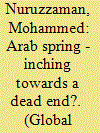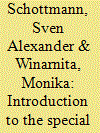|
|
|
Sort Order |
|
|
|
Items / Page
|
|
|
|
|
|
|
| Srl | Item |
| 1 |
ID:
125075


|
|
|
|
|
| Publication |
2013.
|
| Summary/Abstract |
A high degree of pessimism continues to hold a strong grip over the enthusiasts of democracy in the Arab world. In the last more than two years, the popular uprisings for social and political change have stalled in Bahrain, Syria, and Yemen. In Egypt, Libya, and Tunisia, where the populace succeeded in toppling the authoritarian rulers, the situation did not change that much. Violence, conflicts, and killings of political opponents disturbingly characterize all the Arab countries affected by the popular uprisings. In Syria, the government and opposition forces are locked in a deadly conflict with neither side being able to make a decisive breakthrough. The Egyptian army overthrew the country's first democratically elected government, headed by the Muslim Brotherhood, on 3 July 2013. On the whole, the success rate of democratization is so far disappointing. That begs the question whether the Arab popular uprisings for democratic change, what the media has conveniently dubbed the 'Arab Spring', are failing or still enduring.
|
|
|
|
|
|
|
|
|
|
|
|
|
|
|
|
| 2 |
ID:
125025


|
|
|
|
|
| Publication |
2013.
|
| Summary/Abstract |
The second half of the twentieth century witnessed the rise of what might arguably be described as political religion, with faith traditions everywhere experiencing parallels to the rise of Hindutva in India or the 'muscular' and virulently anti-minority political Buddhism of Sri Lanka and Myanmar. Similarly, Israel, a country founded by cosmopolitan, social-democratic nineteenth century perceptions of Jewish 'national' identity, is increasingly struggling with its ostensibly secular founding ethos. Religiously conservative political parties and attitudes have become mainstreamed in Israel's political landscape in the last couple of decades.1 What might help account for these seemingly similar developments, all of which appear to contradict the basic dictum of secularization theory, namely that increasingly prosperous, urban and industrialized societies will relegate religion and religious practices to the private sphere of a personal 'faith'? Until recently, the assumption persisted that the historical experience of Western Europe, the first part of the world to undergo industrialization and the wider sociocultural effects associated with the process of 'secularization', would be replicated as other parts of the world modernized. An important debate has ensued over the past 20 years or so, involving scholars representing a wide range of disciplinary backgrounds over what appears to be the revitalization of religion and even possibly processes of de-secularization.
|
|
|
|
|
|
|
|
|
|
|
|
|
|
|
|
|
|
|
|
|